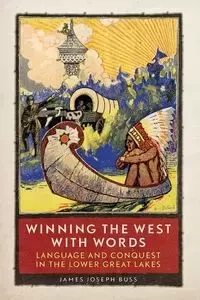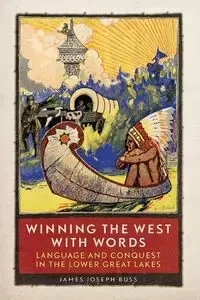Winning the West with Words - James J. Buss
- Language and Conquest in the Lower Great Lakes
Indian Removal was a process both physical and symbolic, accomplished not only at gunpoint but also through language. In the Midwest, white settlers came to speak and write of Indians in the past tense, even though they were still present. Winning the West with Words explores the ways nineteenth-century Anglo-Americans used language, rhetoric, and narrative to claim cultural ownership of the region that comprises present-day Ohio, Indiana, and Illinois.
Historian James Joseph Buss borrows from literary studies, geography, and anthropology to examine images of stalwart pioneers and vanished Indians used by American settlers in portraying an empty landscape in which they established farms, towns, and “civilized” governments. He demonstrates how this now-familiar narrative came to replace a more complicated history of cooperation, adaptation, and violence between peoples of different cultures.
Buss scrutinizes a wide range of sources—travel journals, captivity narratives, treaty council ceremonies, settler petitions, artistic representations, newspaper editorials, late-nineteenth-century county histories, and public celebrations such as regional fairs and centennial pageants and parades—to show how white Americans used language, metaphor, and imagery to accomplish the symbolic removal of Native peoples from the region south of the Great Lakes. Ultimately, he concludes that the popular image of the white yeoman pioneer was employed to support powerful narratives about westward expansion, American democracy, and unlimited national progress. Buss probes beneath this narrative of conquest to show the ways Indians, far from being passive, participated in shaping historical memory—and often used Anglo-Americans’ own words to subvert removal attempts.
By grounding his study in place rather than focusing on a single group of people, Buss goes beyond the conventional uses of history, giving readers a new understanding not just of the history of the Midwest but of the power of creation narratives.
EAN: 9780806163529




Indian Removal was a process both physical and symbolic, accomplished not only at gunpoint but also through language. In the Midwest, white settlers came to speak and write of Indians in the past tense, even though they were still present. Winning the West with Words explores the ways nineteenth-century Anglo-Americans used language, rhetoric, and narrative to claim cultural ownership of the region that comprises present-day Ohio, Indiana, and Illinois.
Historian James Joseph Buss borrows from literary studies, geography, and anthropology to examine images of stalwart pioneers and vanished Indians used by American settlers in portraying an empty landscape in which they established farms, towns, and “civilized” governments. He demonstrates how this now-familiar narrative came to replace a more complicated history of cooperation, adaptation, and violence between peoples of different cultures.
Buss scrutinizes a wide range of sources—travel journals, captivity narratives, treaty council ceremonies, settler petitions, artistic representations, newspaper editorials, late-nineteenth-century county histories, and public celebrations such as regional fairs and centennial pageants and parades—to show how white Americans used language, metaphor, and imagery to accomplish the symbolic removal of Native peoples from the region south of the Great Lakes. Ultimately, he concludes that the popular image of the white yeoman pioneer was employed to support powerful narratives about westward expansion, American democracy, and unlimited national progress. Buss probes beneath this narrative of conquest to show the ways Indians, far from being passive, participated in shaping historical memory—and often used Anglo-Americans’ own words to subvert removal attempts.
By grounding his study in place rather than focusing on a single group of people, Buss goes beyond the conventional uses of history, giving readers a new understanding not just of the history of the Midwest but of the power of creation narratives.
EAN: 9780806163529

